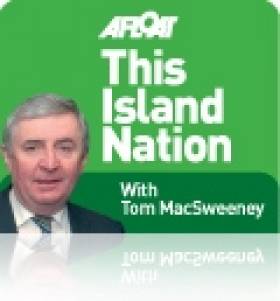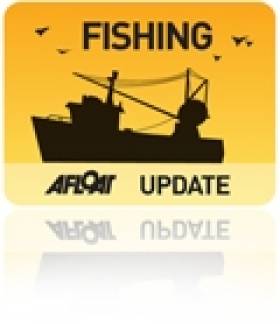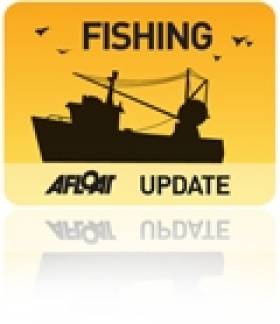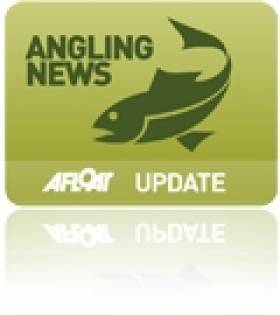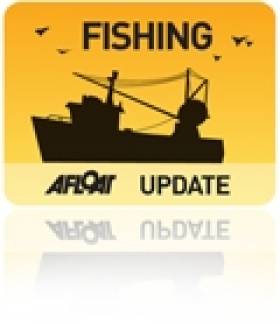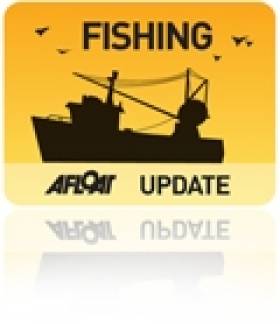Displaying items by tag: commercial fishing
Magnificent Asgard, Commercial Fishermen and a Sticky Situation
ASGARD rises again .. Can you help to find goose barnacles? ... Irish brothers wrap up the 18s in Scotland... Commercial fishermen want bass fisheries re-opened.... The weather hasn't really been so bad – do you believe that? The Channel Tunnel buys ferries ... Lusitania artefacts are assigned to the States and the oceans are saving humans ashore. That is the TIN mix this week.... Read on ....
ASGARD IS MAGNIFICENT
I have reported the conservation of Asgard since it began five years ago under the leadership of John Kearon from Arklow who formerly headed up restoration work at Liverpool Maritime Museum where I saw him direct the refurbishment of the Wolfe Tone Bantry Longboat. Both are now on public display at the National Museum in Collins Barracks, Dublin. Asgard looks magnificent, painted on the port side, the varnished hull gleaming on starboard. Standing under the port side at the opening ceremony as she went on public exhibition, I remembered how she had looked when I first saw her, raw, much in need of attention so many years back when John told me with confidence that she would be restored to what she had originally looked like. There was painstaking tracing of artefacts, of locating many items which had been removed from the vessel in previous years. There was a lot of controversy and opposition to the restoration from those who wanted her to go afloat again. They opposed the concept of a vessel being preserved ashore, out of her natural environment. There is no doubt in my mind that the correct decision was taken, to make her a national treasure, on display, open for viewing free-of-charge to the public, a reminder of the birth of our nation and her pivotal role in the 1914 Howth gun-running from which weapons unloaded were later used in the Easter Rising. She will also be remembered as Ireland's first national sail-training vessel. All those memories flowed from the large attendance present when she went on display. I met many friends from the maritime sphere. A common comment was the regret that there is not an Asgard 3 to carry on the great tradition of this name in Irish sail training. The former government and Minister responsible at the time, Willie O'Dea, destroyed Irish sail training, a denial of Ireland's maritime role and of the educational and cultural, formative role of young people through the sea. Is there anyone, any wealthy Irish businessman or business group, who would provide the funding for an Irish sail training vessel. It would have been possible to purchase a new vessel for the €3.8m. compensation paid for the sinking of Asgard 2 but Willie O'Dea handed over that money to the Department of Finance, a blow against Ireland's maritime sphere.
COMMERCIAL FISHERMEN WANT BASS FISHERIES OPENED
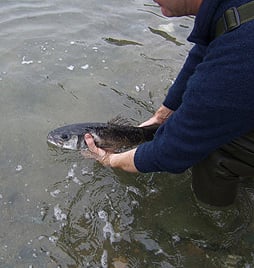 The Irish Fishermen's Organisation has called on Marine Minister Simon Coveney to re-open bass fisheries to commercial fishermen. They have been closed for several years but that may lead to Ireland being excluded forever from fishing bass, while foreign vessels in the EU can catch the fish in Irish waters. The EU has begun a process to put controls on the catching of bass by commercial boats, known as the TAC - Total Allowable Catch. Officials have proposed that this be based on commercial landings of bass over a ten-year period. But Ireland will have no adequate record to claim part of this TAC, so once again the Irish government approach will damage the Irish fishing industry and allow foreign nations to continue catching in Irish waters, while Irish boats cannot. The leisure angling industry demanded and got the ban and has benefited from non-commercial catches. While Irish fishermen are banned from catching bass, foreign boats have targeted the species off the South coast and will be allowed continue, even if a TAC is imposed because they have a catching record. "The Irish Government is again handing national resources to foreign usage," said the commercial fishermen's organisation. Anglers are only allowed to have two bass in their possession in any one 24-hour period and they must be over 40 cm. in total length.
The Irish Fishermen's Organisation has called on Marine Minister Simon Coveney to re-open bass fisheries to commercial fishermen. They have been closed for several years but that may lead to Ireland being excluded forever from fishing bass, while foreign vessels in the EU can catch the fish in Irish waters. The EU has begun a process to put controls on the catching of bass by commercial boats, known as the TAC - Total Allowable Catch. Officials have proposed that this be based on commercial landings of bass over a ten-year period. But Ireland will have no adequate record to claim part of this TAC, so once again the Irish government approach will damage the Irish fishing industry and allow foreign nations to continue catching in Irish waters, while Irish boats cannot. The leisure angling industry demanded and got the ban and has benefited from non-commercial catches. While Irish fishermen are banned from catching bass, foreign boats have targeted the species off the South coast and will be allowed continue, even if a TAC is imposed because they have a catching record. "The Irish Government is again handing national resources to foreign usage," said the commercial fishermen's organisation. Anglers are only allowed to have two bass in their possession in any one 24-hour period and they must be over 40 cm. in total length.
CAN YOU HELP RESOLVE A STICKY SITUATION?
Humans have not managed to create glues that can be used successfully in wet environments, but sea creatures have and Irish marine researchers are trying to find out how they do it. The secrets of the goose barnacle are being sought so that a synthetic version of their natural underwater glue could be used in surgery and dentistry. This barnacle is mostly at sea so examples are difficult to find ashore. Although goose barnacles look like giant shellfish attached to a long neck, they are in fact filter-feeding creatures.They have an ability to attach themselves to practically every surface and researchers have found they can even do so to non-stick frying pans! The glue-like substance they emit, which hardens into a strong "cement", consists of several proteins. Scientists based at the Martin Ryan Marine Institute in Galway hope to study the glands emitting the glue and the protein composition. The team needs a large supply of goose barnacles and has asked for public help from people on the beaches, swimming, surfing and from divers. The barnacles sporadically wash ashore in Summer along the Irish coast. "It might seem perfectly ordinary that a sea creature can stick to a surface, but if you stop to think about it, it's actually quite an incredible innovation by nature," say the researchers. "Humans haven't managed to create glues that can be used successfully in wet environments, but nature has done it over and over again."
TUNNEL BUYS FERRIES – UK GOVERNMENT WANTS TO KNOW WHY
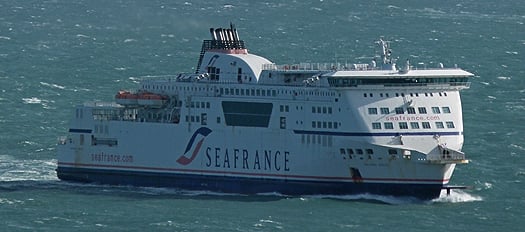
Eurotunnel, the company which operates the Channel Tunnel, has bought three of SeaFrance's former vessels. The move surprised the UK Government where the Office of Fair Trading has launched an investigation to decide whether the purchase is in contravention of merger rules. Eurotunnel Chief Executive Officer Jacques Gounon Jacques Gounon said: "There's an evolution in traffic, notably towards heavy goods vehicles, which can't be fully captured by the Channel Tunnel."
CORK BROTHERS WRAP UP THE 18S IN SCOTLAND
Cork Harbour Monkstown Bay Sailing Club members, brothers Ewen and Colin Barry won nine of the ten trophies up for competition at the National 18 Class Championships in Findhorn in Scotland, a stunning achievement.
Colin is the Club's Rear Commodore and Ewen is Hon.Treasurer. Another MBSC member, Dave O'Connell, a long-time stalwart of the Class was fifth overall in a fleet which included entries from the Scottish host club, from Temasis Yacht Club in London, the Isle of Man YC and the Royal Cork.
Ewen and his crew were sailing 'Good Bad & Ugly' and were top overall boat on nine points, six clear of brother Colin and his crew sailing 'Purple Warriors' on 13 points in second place. They finished on the same number of points as Colin Chapman from the RCYC. A tie-breaker, used in sailing to establish final positions from the best individual race placings, favoured the Monkstown crew. The National 18-foot dinghy has survived several assaults on its popularity, one of which was from the development of the 1720 Class, named after the founding year of the Royal Cork and which it was once thought would replace the 18. That did not happen and, after a surge of popularity, the 1720 declined for a number of years locally though gaining a lot of support internationally. It is now regaining popularity as a sportsboat.
STATE GETS LUSITANIA ITEMS
Items recovered from the last survey of the wreck of the Lusitania have undergone conservation and maintenance in Ireland and been assigned to the State. They include part of the steering mechanism, a bronze telemotor, four portholes, two of them from the first-class passenger area and an indicator used for finding the ship's direction. The items were recovered during the filming of the recently-transmitted National Geographic Channel television documentary. The company sponsored the last survey carried out a year ago.
There have been legal disagreements between American millionaire Greg Bemis who owns the wreck and the State, but there were negotiations involving the National Museum, the National Monuments Service and his representatives after the survey in which Irish maritime archaeologists were involved.
A BAD SUMMER - BUT IT COULD BE WORSE!
It has been a bad summer but history shows that there have been much worse! 1783 for example when there was so much volcanic activity around the world and a fog that lasted most of the summer in England, leading to predictions that it was the end of the world! Between June 23 and July 20 of that year the skies over the UK were covered by a smoky fog and there was regular thunder and lightning which terrified people. There were volcanic eruptions in Italy and Japan and a massive eruption on Skaptar Jokull in Iceland where 9,500 people were reported to have died after being smothered by the immense dust cloud which drifted south and covered much of Europe.
Remember the last Icelandic cloud?
OCEANS ARE SAVING US
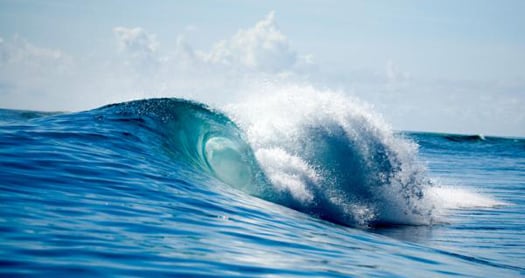
If the oceans were not soaking up carbon dioxide from land, global warming would be much worse. A new report this week shows that industrial production and human living requirements on land are now creating so much carbon dioxide in the atmosphere that the oceans and plants ashore are having to absorb more than twice the amount they previously soaked up. They are the only brake on global warming, but having to absorb so much CO2 is changing seawater, a process called ocean acidification. "This change will have profound effects on life in the ocean and those who depend on it," according to the report from the University of Colorado in the USA which confirms data from the Global Carbon Project, linking scientists around the world. Carbon soaked up from the atmosphere by the seas has risen to 5 billion tonnes. Twenty years ago the figure was 2.4 billion.
Email comments, opinions, information to: [email protected] more marine news and comment on Twitter: @TomMacSweeney
And on Facebook – THIS ISLAND NATION page
#FISHING - The Irish Farmers' Association (IFA) aquaculture executive has criticised the Government's grant aid scheme announced this week, claiming that it rules out the majority of Ireland's fish farming industry from accessing funds.
Richie Flynn said that the rules for grant aid insist that applicants hold a "current licence", which he claims is "virtually impossible" to procure at present.
“The prolonged and unnecessary delays in dealing with licenses are within the control of the Department of Agriculture, Marine and Food to resolve with the National Parks and Wildlife Services," he said. "The fact that they have not succeeded in issuing renewals to industry since 2007 is their fault.
"Now we have a situation where to avail of grant aid, the same department are insisting on having an up to date licence, which is virtually impossible to achieve, from their colleagues in the same offices in Clonakilty.
"It makes a mockery of the grant aid system and exposes the insanity of holding back an industry which can provide vital jobs and exports for our coastal peripheral areas."
The IFA also described as "technically and practically unfeasible" the Government's insistence that grant-funded projects be completed before the end of the calendar year.
“The industry is wondering if the department is deliberately trying to set up a situation where they give themselves no choice but to give back their aquaculture budget to the Department of Finance for the third year in a row to make themselves look good," he said. "From the point of view of fish farmers, processors, customers, suppliers, consumers and industry watchers, it looks anything but good."
Flynn called on Minister for the Marine Simon Coveney to "re-examine his own departmentally imposed restrictions, which are not required by EU rules, and give a boost to a sector which has serious demand for its products and a bright future ahead if domestically imposed obstacles are removed.”
Fishing Industry Welcomes Selective Nets, Grant Aid at Irish Skipper Expo
#FISHING - Minister for the Marine Simon Coveney briefed the Irish Skipper Expo in Galway last weekend on a new initiative promoting the use of selective conservation fishing nets, which allow young fish to escape.
Under the initiative in the Celtic Sea, additional quotas of up to 25% will be made available by the minister to skippers of Irish fishing boats which use an escape panel in their nets, allowing young whiting and haddock to escape.
The escape panel, developed by the Irish industry, has been endorsed at EU level and is expected to be a mandatory requirement later in the year.
Minister Coveney said on Saturday: “The use of this panel will significantly reduce discards of juvenile whiting and haddock in the Celtic Sea, allowing juvenile fish to grow and mature and contribute to increased stock size and returns for fishermen in future years.
"I believe that this offers an example of a practical approach to dealing effectively with the discards problem and retention of a flexible quota allocation system that we should take forward in the context of the Common Fisheries Policy Review."
In other news, Bord Iascaigh Mhara (BIM) announced €1.5 million in grant aid for the Irish fishing industry at the expo.
A spokesperson for BIM confirmed to the Galway Independent that the funding will be available to industry through a variety of schemes including fleet safety, seafood environmental management, lobster V-notching and coastal action groups.
Over 100 companies displayed their products and services to fishermen at the Irish Skipper Expo International 2012, held at the Galway Bay Hotel on 24-25 February.
- Fishing
- commercial fishing
- Minister for the Marine
- Simon Coveney
- Irish Skipper Expo
- Skipper Expo International
- 2012
- Galway Bay Hotel
- Galway
- conservation
- selective
- quota
- Celtic sea
- initiative
- discards
- grant aid
- Bord Iascaigh Mhara
- BIM
- Funding
- Coastal
- Seafood
- whiting
- haddock
- juvenile fish
- Common Fisheries Policy
Salmon Conservation Scheme Extended to 2012
#ANGLING - Inland Fisheries Ireland's Salmon Conservation Scheme has been extended into 2012, with funding increased to a total of €200,000.
The pilot scheme will facilitate the rehabilitation of salmon stocks, giving priority to rivers below their conservation limit which have the greatest prospect of recovery.
Applications are now being invited for salmon conservation projects, to a maximum value of €10,000 per project. Applicants must outline the benefits of the project, the ability to plan and complete the project, and value for money. Any statutory approvals necessary, such as planning permission, must be in place.
Examples of schemes that can be funded include: fish passage improvement; spawning enhancement, instream structures such as weirs and deflectors; river bank protection; tree pruning and planting; and removal of invasive species.
Minister for Communiations, Energy and Natural Resources, Pat Rabbitte, commented: "This scheme has been proven to enhance habitat, knowledge and ultimately the wonderful angling and commercial fisheries we enjoy in Ireland adding benefit to local economies."
Application forms are available from the Inland Fisheries Ireland website HERE.
The closing date for applications is 31 March 2012.
Decision on Castlemaine Fishing 'A Matter of Urgency'
A decision on the reopening of Castlemaine Harbour to wild salmon fishing will be made "as a matter of urgency", says the Department of Communications, Energy and Natural Resources.
The Kerryman reports that the department has confirmed 25 submissions were received during a 30-day consultation after plans were announced to reopen the harbour to commercial fishing in May.
Local fishermen have welcomed the move, though angling and conservation groups have voiced their opposition, with Guy Buxton of the Kerry Anglers' Federation saying that the reopening "could not be justified" on any grounds.
Fishing to be Reopened at Castlemaine Harbour
Minister for Natural Resources Pat Rabbitte has announced plans to reopen licensed commercial fishing in Castlemaine Harbour in Co Kerry, following the results of last year's pilot fishery.
“I am satisfied, based on scientific and fishery management advice... that it is safe to reopen this fishery under closely controlled conditions," said Minister Rabbitte. "The trial fishing conducted in the harbour last year establishes that this can be done without impinging on threatened stocks."
A statutory 30-day public consultation has now commenced on the required amendment to the Wild Salmon and Sea Trout Tagging Scheme 2011 to provide for the fishery's reopening.
"The consultation period will give those who disagree with that conclusion to put forward their views and I will pay close attention to what they say before reaching a final conclusion on the matter," the minister added.
Minister Rabbitte has also tasked Inland Fisheries Ireland with ensuring full enforcement of relevant quotas and conservation by-laws.



























